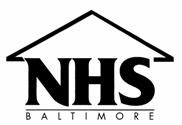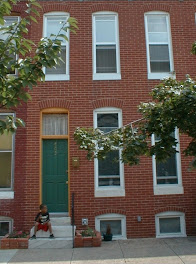By: Alicia Schuller, Marketing Coordinator, NHS of Baltimore
As a HUD certified counseling agency, NHS of Baltimore wants to remind people of the importance of staying financially fit all year round. Although April was designated by Congress as Financial Literacy Month, consumers should not be quick to forget the lessons they have learned.
"During April, government agencies, schools, businesses and other organizations were encouraged to engage in programs or activities to raise the nation's awareness of the importance of financial education. With the nation's economic crisis now spanning about 18 months, we have even more reasons to promote financial education not just in April but year-around," said Sandra Thompson, Director of FDIC Division of Supervision and Consumer Protection.
The current recession calls upon each and every one of us to be more frugal and to live within or below our means, so as not to over-extend ourselves. We offer these simple tips to staying on top of your money.
• Create a budget. Examine last month’s bank statement. Create a budget spreadsheet armed with information about your wages, how much you spend each month, and categorize your spending. Expense categories can include: Rent or Mortgage, Gas, Groceries, Utilities, Insurance, Car Payment, Credit Card Payment, and more. After you see how much you are making, how much you are spending, and what you are spending your money on, you will be better able to create a budget that works for you.
• Cut expenses. Going out for lunch or dinner, daily trips to the coffee shop, and more, add up. After creating a budget and examining your spending over the last month, you will likely see expenses that can be cut, which may add up to monthly savings in your bank account. Instead of buying a daily cup of coffee, make a cup at home. Bring your lunch instead of buying it everyday. Cook dinner at home with your family or friends instead of meeting up a few times a week. The combination of coffee at home and a bag lunch a couple of days a week has the potential to save more than $50 each month.
• Tackle debt. Once you cut unnecessary expenses, you may find a little extra money that can be used to tackle any debt you may have. To be truly financially fit, work on paying down and eventually eliminating your debt by paying more than the monthly minimum payment. The monthly minimum payment may barely cover the interest the debt accrues, which means that by paying the minimum each month, it could take more than a dozen years to pay off the debt. By paying even a little more than the minimum, you are working your way toward financial fitness.
• Build an emergency fund. With each paycheck, make an effort to contribute to a savings account separate from your checking account. Each contribution, no matter the amount, builds a cushion for emergencies down the road.
• Enroll in a Financial Fitness course. These courses will teach you money management skills that can help put you on the path to decreasing debt and increasing resources. Financial literacy can also help you become more aware of common pitfalls – including consumer scams and predatory lending practices – and how to avoid them. NHS of Baltimore offers these courses free of charge on a monthly basis.
• Avoid being scammed. If you are facing financial difficulty from foreclosure, job loss, credit card debt, and aren’t sure where to turn for guidance, seek help from a nonprofit, HUD approved housing or credit counseling organization. Avoid scam companies that contact you first and promise to “eliminate debt” in their advertising. Nonprofit organizations have your best interest at heart and will work with you one-on-one to remedy your situation. The old adage, “You get what you pay for,” does not apply with reputable nonprofits.
NHS of Baltimore offers Financial Fitness courses year round, free of charge from a HUD certified counselor. If you are interested in taking a class, call today. 410-327-1200 or click here to view a schedule.
skip to main |
skip to sidebar
+for+blog.jpg)
.JPG)
.jpg)
Baltimore boy enjoys the day on his front step

.JPG)
Potential homeowners attend our Homebuyer Education Class
.JPG)
Executive Director, Felix Torres Colon accepts governor's committment to excellence award

Board Chair, Ron Huffman helps seal the foundation of homeownership
Helping you endure these trying times by offering vital tips and information about homeownership and financial fitness.
FACING FORECLOSURE?
We can help. NHS of Baltimore is one of the leading foreclosure prevention nonprofits in the Baltimore region. We offer HUD certified counseling, loan modification mediation and refinancing. Get help today! 410-327-1200
NHS of Baltimore Website
Take our Homebuyer Education Class Online!
+for+blog.jpg)
- Neighborhood Housing Services of Baltimore Inc.
- For more information on our homebuyer education classes, foreclosure prevention, or to donate, please visit our website or call, 410-327-1200.
Blog Archive
-
▼
2009
(98)
-
▼
May
(6)
- Getting Rid of Deceiving Property Tax Ads in Balti...
- New Credit Bill Lends Support for Consumer Rights
- Ms. Sydnor's Housing Rehab Success Story
- Get Involved With NHS of Baltimore and Give Back t...
- Maryland Housing Counselors Network Conference Bri...
- Now That Financial Literacy Month is Over, Stay on...
-
▼
May
(6)
.jpg)
Baltimore boy enjoys the day on his front step

Potential homeowners attend our Homebuyer Education Class
Executive Director, Felix Torres Colon accepts governor's committment to excellence award
Board Chair, Ron Huffman helps seal the foundation of homeownership



